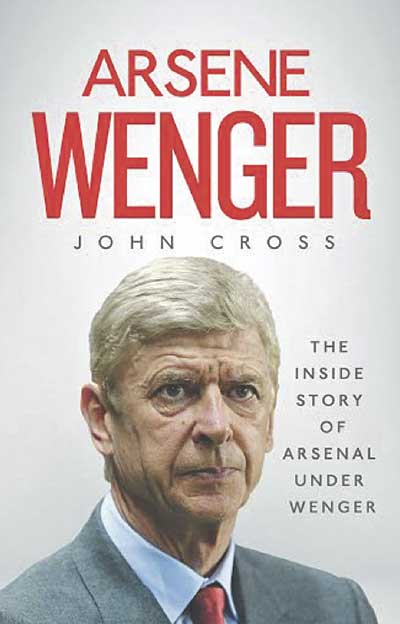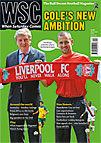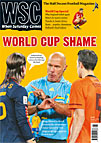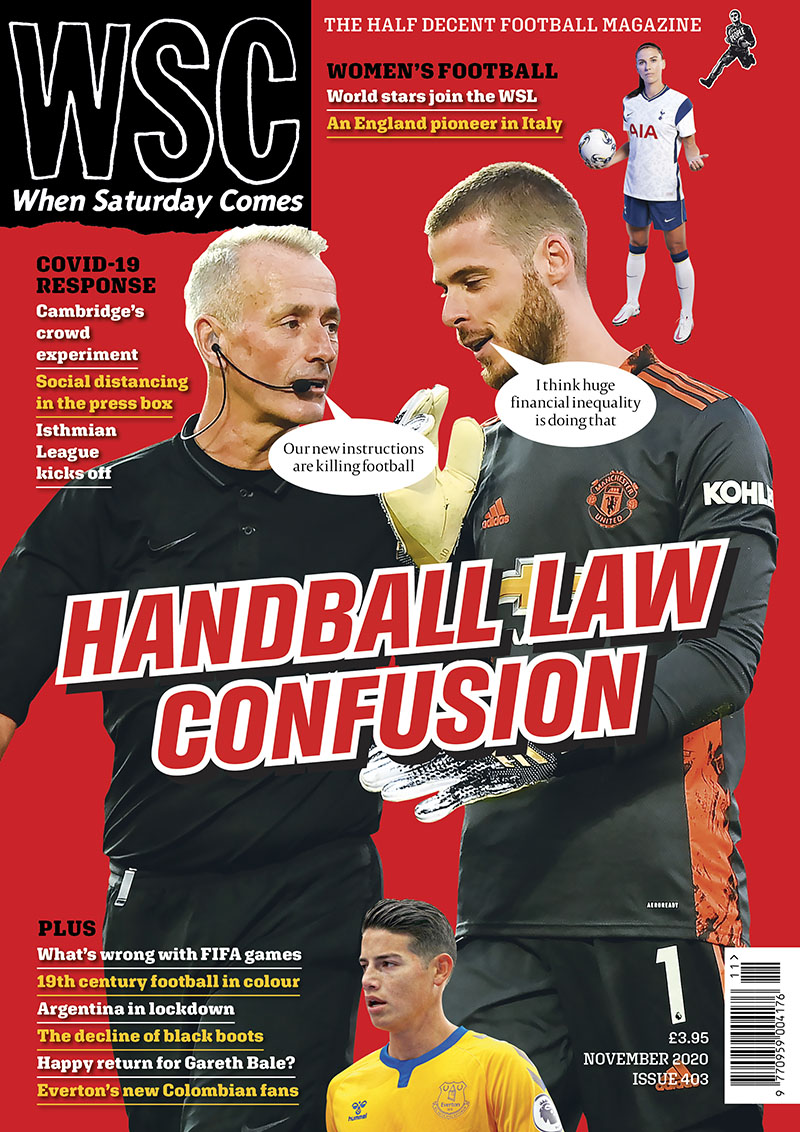Search: ' Nicklas Bendtner'
Stories
 by John Cross
by John Cross
Simon & Schuster, £20
Reviewed by David Stubbs
From WSC 346 December 2015
Supporters of one of the Big Four Or Five teams each have different ideas why their club, overbearingly large as it might seem, actually has some core value. For Arsenal, there was once a sense of shame even among their own fans that they were one-nil blaggers who added little to the overall value of the game. That has turned round completely under Arsène Wenger.
Although, as many interviewed by John Cross in this latest biography testify, he is perhaps an even worse loser than Alex Ferguson, Wenger holds fast to what is vaguely described as his “philosophy”, which has traditionally consisted of valuing attack over defence, maintaining aesthetic values rather than grinding out victories, imposing your own style of play rather than merely reacting to your opponents.
This is a source of pride to Arsenal fans but also, increasingly, exasperation, one only partly stemmed by the recent two trophies and a softening of said philosophy. His baffling reluctance to spend available funds has also led to some stormy AGMs, with fans suspicious at the amounts they must today shell out to watch their fitfully aesthetic but too often brittle also-rans.
Mirror journalist Cross is not to able to answer the question of whether Arsenal’s relative lack of spending is down to Wenger himself or the club, who have become complacently happy with their cash cow. From the earliest pages, we know from Cross’s admiring tone towards Wenger not to expect any scathing, incisive critiques of his subject; he is far too valuable a contact in the author’s day job.
He begins with an account of how he visited Pope Francis rather than attend to transfer deadline day, in terms inviting us to marvel at the manager’s spirituality and indifference to the mammon of the modern game. The text is similarly lavished with borderline sycophantic tributes to Wenger’s intellect, erudition and integrity, lest this sometimes thin-skinned man take the slightest offence.
The book, however, does yield some intriguing facets of his time at Arsenal, where he arrived in 1996 to bewilderment from its core of bibulous, hard-bitten professionals, whose careers and habits he turned upside down, generally for their own good. Cross is decent on Wenger’s golden years, and details of the new regimen he instilled, drawing on interviews with ex-players such as John Hartson and Nigel Winterburn.
For a man whose hobby as an escape from watching football is generally assumed to be watching football, Cross reveals one or two fun details about the private Wenger; his interest in politics, and his belief that both communism and capitalism are failed systems; his love and aptitude for dancing, which would probably see him progress a long way on a future series of Strictly, for example. He also reveals less palatable aspects of Wenger, such as his occasionally short way with staff, and his snubbing of Gaël Clichy, or examples of his loss of temper with players, such as the time Nicklas Bendtner was taking the piss out of X Factor: “You think there is something funny about losing?” He also reveals how close Arsenal came to not being able to pay their wage bill during a cash flow crisis in 2004.
While Cross’s prose is not exactly silvery, this is about as revealing an account of Wenger’s career as we’re likely to get in his lifetime.
 Gavin Willacy explores the demise of reserve team football and considers whether there is any hope for future generations
Gavin Willacy explores the demise of reserve team football and considers whether there is any hope for future generations
Nicklas Bendtner, Giuseppe Rossi, Michael Chopra, Gabriel Agbonlahor, Shaun Wright-Phillips, Danny Graham, Sylvan Ebanks-Blake and Adam Johnson: not a bad list of attacking talent. Five years ago, all of those were among the top goalscorers in the FA Premier Reserve League. In the Man Utd team that beat Tottenham in the play-off final at Old Trafford in May 2006 were a future World Cup winner (Gerard Piqué), a former European Cup winner (Ole Gunnar Solskjaer), a World Cup goalkeeper (Tim Howard) and a trio of current United stars (Jonny Evans, Darron Gibson and Darren Fletcher). That summer I wrote in WSC 235 about the demise of reserve team football, from being a well-followed event in every club’s week, to an occasional irritant ignored by most. Things have got even worse.
More clubs than ever have pulled out of the three leagues this season. Four Premier League sides – Spurs, Stoke, Fulham and Birmingham – refused to play in the Premier Reserve League (PRL) while 31 of the 72 Football League clubs are nowhere to be seen in the Central League or Football Combination. Instead, there are six Conference clubs making up the numbers. Most clubs give the same reasons for withdrawing: the opposition are full of teenagers, games are played at non-League grounds and the fixtures come at inconvenient times. The first two could be solved by the clubs themselves and the third is invalid. Combination fixtures are postponed and altered at a whim anyway and with just 12 league games each, they should hardly be difficult to fit into a nine-month season.
The opt-outs play “reserve friendlies” instead – mainly Under-20 XIs playing each other on midweek afternoons on training ground pitches, often managed by the youth staff, not first-team coaches. Hardly the experience required to help prepare them for first-team football. One result of the FA’s new Elite Player Performance Plan (see Thanks for nothing, WSC 290) is the end of the PRL and further weakening of the historic Central League and Football Combination, perhaps beyond repair. Instead there is the FA Premier Development League (PDL), a specific programme for the 18-21 age group often overlooked at the smaller, under-staffed clubs.
Generations before mine watched the reserves play at home on Saturday afternoons while the first team were playing away. Until the last decade, reserve football was usually played on midweek evenings at main stadiums with a smattering of first-team players on show to four-figure crowds. Arsenal have retained that to an extent – their PRL games at Underhill are often lively affairs packed with young and vocal fans. But Barnet is deep in Arsenal territory. West Ham play their reserve games at Bishop’s Stortford, an hour’s drive from Upton Park. Nowadays most reserve games are for the obsessive fanatic, the ground-hopper or the shift-worker.
Some clubs still use the stiffs in the traditional sense. Leyton Orient and Gillingham play their home reserve games on their main ground, thus making it less of a humbling comedown for the senior players and giving their emerging youth teamers a taste of a bigger stage. By playing on a midweek afternoon, though, they save the cost of floodlights but guarantee a pitiful attendance.
The FA wants young players to be rehearsing for the professional game by playing weekly matches, preferably in front of partisan crowds. At the moment reserves face dingy dressing rooms, a muddy pitch and a few quips from isolated spectators dotted around a non-League ground. Gareth Southgate said recently that he played 112 reserve games before making his Crystal Palace debut at 21. That grounding toughened him up and Palace waited until he was ready. It would take an unfeasible six to eight seasons to get that experience now. And if he was at Palace they would be friendlies at training grounds, not competitive games at Selhurst Park.
The current average age of players in the PRL is 21, but there will be no age limit to the PDL. Instead it is expected to be manned by Under-21 players with no bar on older professionals making occasional appearances. Just like the current reserve leagues. Rugby league did something very similar a few years ago, replacing its Alliance (open age reserves) competition with an Under-20s Cup. But with each club allowed three overage players, you still get the occasional international veteran sticking out like a sore thumb. Consequently, any talent over the age of 20 that can’t get in the first team is shipped out on long-term loan or released altogether. Football will surely continue down the same route.
From WSC 291 May 2011
 New rules announced by both UEFA and the Premier League are meant to curb football's financial excesses. but, as Mark Brophy points out, they might not have that much effect on the big clubs
New rules announced by both UEFA and the Premier League are meant to curb football's financial excesses. but, as Mark Brophy points out, they might not have that much effect on the big clubs
UEFA’s impending Financial Fair Play regulations have met with seemingly universal approval. Starting in 2012, clubs who fail to comply with the rules laid down will be barred from European competition. Clubs spending more than the income they generate will fall foul of the rules, as will those which spend more than 70 per cent of turnover on wages, have unsustainable debt or fail to pay debts on time. At the same time Premier League rules limiting squad size to 25 with eight places reserved for homegrown players have come into effect for the new season, again to general acclaim.
 Relive four weeks of statements of the obvious from the pundits, daily complaints about the wobbly ball and over-emphatic pronunciations of Brazilian names
Relive four weeks of statements of the obvious from the pundits, daily complaints about the wobbly ball and over-emphatic pronunciations of Brazilian names
June 11
South Africa 1 Mexico 1
“It’s in Africa where humanity began and it is to Africa humanity now returns,” says Peter Drury who you feel would be available for film trailer voiceover work when it’s quieter next summer. Mexico dominate and have a goal disallowed when the flapping Itumeleng Khune inadvertently plays Carlos Vela offside. ITV establish that it was the right decision: “Where’s that linesman from, that football hotbed Uzbekistan?” asks Gareth Southgate who had previously seemed like a nice man. "What a moment in the history of sport… A goal for all Africa,” says Drury after Siphiwe Tshabalala crashes in the opener. We cut to Tshbalala’s home township – “they’ve only just got electricity” – where the game is being watched on a big screen which Jim Beglin thinks is a sheet. Cuauhtémoc Blanco looks about as athletic as a crab but nonetheless has a role in Mexico’s goal, his badly mishit pass being crossed for Rafael Márquez to score thanks to a woeful lack of marking. The hosts nearly get an undeserved winner a minute from time when Katlego Mphela hits the post. Óscar Pérez is described as “a personality goalkeeper” as if that is a tactical term like an attacking midfielder. Drury says “Bafana Bafana” so often it’s like he’s doing a Red Nose event where he earns a pound for an irrigation scheme in the Sudan every time he manages to fit it in.
